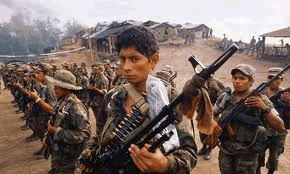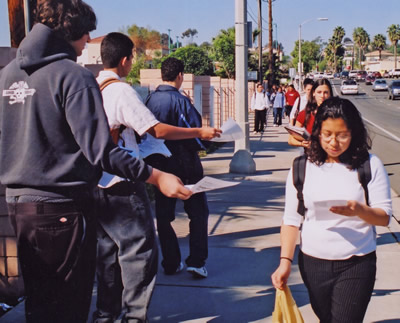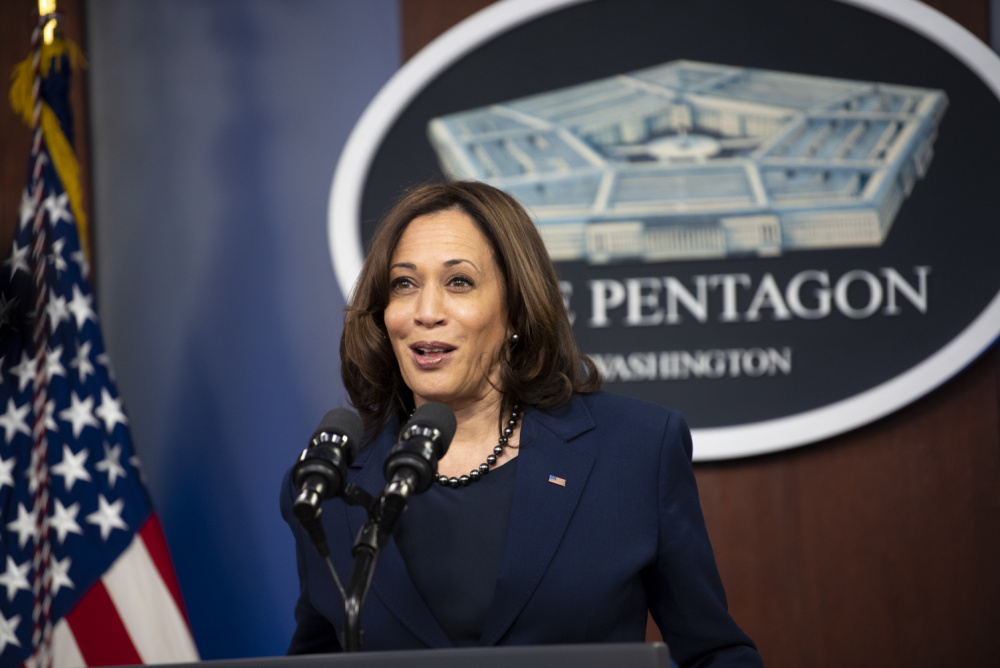 Since the September 11 attacks on the United States, most people in the world agree that the perpetrators need to be brought to justice, without killing many thousands of civilians in the process. But unfortunately, the U.S. military has always accepted massive civilian deaths as part of the cost of war. The military is now poised to kill thousands of foreign civilians, in order to prove that killing U.S. civilians is wrong.
Since the September 11 attacks on the United States, most people in the world agree that the perpetrators need to be brought to justice, without killing many thousands of civilians in the process. But unfortunately, the U.S. military has always accepted massive civilian deaths as part of the cost of war. The military is now poised to kill thousands of foreign civilians, in order to prove that killing U.S. civilians is wrong.
The media has told us repeatedly that some Middle Easterners hate the U.S. only because of our "freedom" and "prosperity." Missing from this explanation is the historical context of the U.S. role in the Middle East, and for that matter in the rest of the world. This basic primer is an attempt to brief readers who have not closely followed the history of U.S. foreign or military affairs, and are perhaps unaware of the background of U.S. military interventions abroad, but are concerned about the direction of our country toward a new war in the name of "freedom" and "protecting civilians."
The United States military has been intervening in other countries for a long time. In 1898, it seized the Philippines, Cuba, and Puerto Rico from Spain, and in 1917-18 became embroiled in World War I in Europe. In the first half of the 20th century it repeatedly sent Marines to "protectorates" such as Nicaragua, Honduras, Panama, Haiti, and the Dominican Republic. All these interventions directly served corporate interests, and many resulted in massive losses of civilians, rebels, and soldiers. Many of the uses of U.S. combat forces are documented in A History of U.S. Military Interventions since 1890: http://academic.evergreen.edu/g/grossmaz/interventions.html
U.S. involvement in World War II (1941-45) was sparked by the surprise attack on Pearl Harbor, and fear of an Axis invasion of North America. Allied bombers attacked fascist military targets, but also fire-bombed German and Japanese cities such as Dresden and Tokyo, partly under the assumption that destroying civilian neighborhoods would weaken the resolve of the survivors and turn them against their regimes. Many historians agree that fire- bombing's effect was precisely the opposite--increasing Axis civilian support for homeland defense, and discouraging potential coup attempts. The atomic bombing of Japan at the end of the war was carried out without any kind of advance demonstration or warning that may have prevented the deaths of hundreds of thousands of innocent civilians.
The war in Korea (1950-53) was marked by widespread atrocities, both by North Korean/Chinese forces, and South Korean/U.S. forces. U.S. troops fired on civilian refugees headed into South Korea, apparently fearing they were northern infiltrators. Bombers attacked North Korean cities, and the U.S. twice threatened to use nuclear weapons. North Korea is under the same Communist government today as when the war began.
During the Middle East crisis of 1958, Marines were deployed to quell a rebellion in Lebanon, and Iraq was threatened with nuclear attack if it invaded Kuwait. This little-known crisis helped set U.S. foreign policy on a collision course with Arab nationalists, often in support of the region's monarchies.
In the early 1960s, the U.S. returned to its pre-World War II interventionary role in the Caribbean, directing the failed 1961 Bay of Pigs exile invasion of Cuba, and the 1965 bombing and Marine invasion of the Dominican Republic during an election campaign. The CIA trained and harbored Cuban exile groups in Miami, which launched terrorist attacks on Cuba, including the 1976 downing of a Cuban civilian jetliner near Barbados. During the Cold War, the CIA would also help to support or install pro-U.S. dictatorships in Iran, Chile, Guatemala, Indonesia, and many other countries around the world.
The U.S. war in Indochina (1960-75) pit U.S. forces against North Vietnam, and Communist rebels fighting to overthrow pro-U.S. dictatorships in South Vietnam, Laos, and Cambodia. U.S. war planners made little or no distinction between attacking civilians and guerrillas in rebel-held zones, and U.S. "carpet-bombing" of the countryside and cities swelled the ranks of the ultimately victorious revolutionaries. Over two million people were killed in the war, including 55,000 U.S. troops. Less than a dozen U.S. citizens were killed on U.S. soil, in National Guard shootings or antiwar bombings. In Cambodia, the bombings drove the Khmer Rouge rebels toward fanatical leaders, who launched a murderous rampage when they took power in 1975.
Echoes of Vietnam reverberated in Central America during the 1980s, when the Reagan administration strongly backed the pro-U.S. regime in El Salvador, and right-wing exile forces fighting the new leftist Sandinista government in Nicaragua. Rightist death squads slaughtered Salvadoran civilians who questioned the concentration of power and wealth in a few hands. CIA-trained Nicaraguan Contra rebels launched terrorist attacks against civilian clinics and schools run by the Sandinista government, and mined Nicaraguan harbors. U.S. troops also invaded the island nation of Grenada in 1983, to oust a new military regime, attacking Cuban civilian workers (even though Cuba had backed the leftist government deposed in the coup), and accidentally bombing a hospital.
The U.S. returned in force to the Middle East in 1980, after the Shi'ite Muslim revolution in Iran against Shah Pahlevi's pro-U.S. dictatorship. A troop and bombing raid to free U.S. Embassy hostages held in downtown Tehran had to be aborted in the Iranian desert. After the 1982 Israeli occupation of Lebanon, U.S. Marines were deployed in a neutral "peacekeeping" operation. They instead took the side of Lebanon's pro-Israel Christian government against Muslim rebels, and U.S. Navy ships rained enormous shells on Muslim civilian villages. Embittered Shi'ite Muslim rebels responded with a suicide bomb attack on Marine barracks, and for years seized U.S. hostages in the country. In retaliation, the CIA set off car bombs to assassinate Shi'ite Muslim leaders. Syria and the Muslim rebels emerged victorious in Lebanon.
Elsewhere in the Middle East, the U.S. launched a 1986 bombing raid on Libya, which it accused of sponsoring a terrorist bombing later tied to Syria. The bombing raid killed civilians, and may have led to the later revenge bombing of a U.S. jet over Scotland. Libya's Arab nationalist leader Muammar Qaddafi remained in power. The U.S. Navy also intervened against Iran during its war against Iraq in 1987-88, sinking Iranian ships and "accidentally" shooting down an Iranian civilian jetliner.
U.S. forces invaded Panama in 1989 to oust the nationalist regime of Manuel Noriega. The U.S. accused its former ally of allowing drug-running in the country, though the drug trade actually increased after his capture. U.S. bombing raids on Panama City ignited a conflagration in a civilian neighborhood, fed by stove gas tanks. Over 2,000 Panamanians were killed in the invasion to capture one leader.
The following year, the U.S. deployed forces in the Persian Gulf after the Iraqi invasion of Kuwait, which turned Washington against its former Iraqi ally Saddam Hussein. U.S. supported the Kuwaiti monarchy and the Muslim fundamentalist monarchy in neighboring Saudi Arabia against the secular nationalist Iraq regime. In January 1991, the U.S..and its allies unleashed a massive bombing assault against Iraqi government and military targets, in an intensity beyond the raids of World War II and Vietnam. Up to 200,000 Iraqis were killed in the war and its imemdiate aftermath of rebellion and disease, including many civilians who died in their villages, neighborhoods, and bomb shelters. The U.S. continued economic sanctions that denied health and energy to Iraqi civilians, who died by the hundreds of thousands, according to United Nations agencies. The U.S. also instituted "no-fly zones" and virtually continuous bombing raids, yet Saddam was politically bolstered as he was militarily weakened.
In the 1990s, the U.S. military led a series of what it termed "humanitarian interventions" it claimed would safeguard civilians. Foremost among them was the 1992 deployment in the African nation of Somalia, torn by famine and a civil war between clan warlords. Instead of remaining neutral, U.S. forces took the side of one faction against another faction, and bombed a Mogadishu neighborhood. Enraged crowds, backed by foreign Arab mercenaries, killed 18 U.S. soldiers, forcing a withdrawal from the country.
Other so-called "humanitarian interventions" were centered in the Balkan region of Europe, after the 1992 breakup of the multiethnic federation of Yugoslavia. The U.S. watched for three years as Serb forces killed Muslim civilians in Bosnia, before its launched decisive bombing raids in 1995. Even then, it never intervened to stop atrocities by Croatian forces against Muslim and Serb civilians, because those forces were aided by the U.S. In 1999, the U.S. bombed Serbia to force President Slobodan Milosevic to withdraw forces from the ethnic Albanian province of Kosovo, which was torn a brutal ethnic war. The bombing intensified Serbian expulsions and killings of Albanian civilians from Kosovo, and caused the deaths of thousands of Serbian civilians, even in cities that had voted strongly against Milosevic. When a NATO occupation force enabled Albanians to move back, U.S. forces did little or nothing to prevent similar atrocities against Serb and other non-Albanian civilians. The U.S. was viewed as a biased player, even by the Serbian democratic opposition that overthrew Milosevic the following year.
Even when the U.S. military had apparently defensive motives, it ended up attacking the wrong targets. After the 1998 bombings of two U.S. embassies in East Africa, the U.S. "retaliated" not only against Osama Bin Laden's training camps in Afghanistan, but a pharmaceutical plant in Sudan that was mistakenly said to be a chemical warfare installation. Bin Laden retaliated by attacking a U.S. Navy ship docked in Yemen in 2000. After the 2001 terror attacks on the United States, the U.S. military is poised to again bomb Afghanistan, and possibly move against other states it accuses of promoting anti-U.S. "terrorism," such as Iraq and Sudan. Such a campaign will certainly ratchet up the cycle of violence, in an escalating series of retaliations that is the hallmark of Middle East conflicts. Afghanistan, like Yugoslavia, is a multiethnic state that could easily break apart in a new catastrophic regional war. Almost certainly more civilians would lose their lives in this tit-for-tat war on "terrorism" than the 3,000 civilians who died on September 11.
COMMON THEMES
Some common themes can be seen in many of these U.S. military interventions.
First, they were explained to the U.S. public as defending the lives and rights of civilian populations. Yet the military tactics employed often left behind massive civilian "collateral damage." War planners made little distinction between rebels and the civilians who lived in rebel zones of control, or between military assets and civilian infrastructure, such as train lines, water plants, agricultural factories, medicine supplies, etc. The U.S. public always believe that in the next war, new military technologies will avoid civilian casualties on the other side. Yet when the inevitable civilian deaths occur, they are always explained away as "accidental" or "unavoidable."
Second, although nearly all the post-World War II interventions were carried out in the name of "freedom" and "democracy," nearly all of them in fact defended dictatorships controlled by pro-U.S. elites. Whether in Vietnam, Central America, or the Persian Gulf, the U.S. was not defending "freedom" but an ideological agenda (such as defending capitalism) or an economic agenda (such as protecting oil company investments). In the few cases when U.S. military forces toppled a dictatorship--such as in Grenada or Panama--they did so in a way that prevented the country's people from overthrowing their own dictator first, and installing a new democratic government more to their liking.
Third, the U.S. always attacked violence by its opponents as "terrorism," "atrocities against civilians," or "ethnic cleansing," but minimized or defended the same actions by the U.S. or its allies. If a country has the right to "end" a state that trains or harbors terrorists, would Cuba or Nicaragua have had the right to launch defensive bombing raids on U.S. targets to take out exile terrorists? Washington's double standard maintains that an U.S. ally's action by definition "defensive," but that an enemy's retaliation is by definition "offensive."
Fourth, the U.S. often portrays itself as a neutral peacekeeper, with nothing but the purest humanitarian motives. After deploying forces in a country, however, it quickly divides the country or region into "friends" and "foes," and takes one side against another. This strategy tends to enflame rather than dampen a war or civil conflict, as shown in the cases of Somalia and Bosnia, and deepens resentment of the U.S. role.
Fifth, U.S. military intervention is often counterproductive even if one accepts U.S. goals and rationales. Rather than solving the root political or economic roots of the conflict, it tends to polarize factions and further destabilize the country. The same countries tend to reappear again and again on the list of 20th century interventions.
Sixth, U.S. demonization of an enemy leader, or military action against him, tends to strengthen rather than weaken his hold on power. Take the list of current regimes most singled out for U.S. attack, and put it alongside of the list of regimes that have had the longest hold on power, and you will find they have the same names. Qaddafi, Castro, Saddam, Kim, and others may have faced greater internal criticism if they could not portray themselves as Davids standing up to the American Goliath, and (accurately) blaming many of their countries' internal problems on U.S. economic sanctions.
One of the most dangerous ideas of the 20th century was that "people like us" could not commit atrocities against civilians.
- German and Japanese citizens believed it, but their militaries slaughtered millions of people.
- British and French citizens believed it, but their militaries fought brutal colonial wars in Africa and Asia.
- Russian citizens believed it, but their armies murdered civilians in Afghanistan, Chechnya, and elsewhere.
- Israeli citizens believed it, but their army mowed down Palestinians and Lebanese.
- Arabs believed it, but suicide bombers and hijackers targeted U.S. and Israeli civilians.
- U.S. citizens believed it, but their military killed hundreds of thousands in Vietnam, Iraq, and elsewhere.
Every country, every ethnicity, every religion, contains within it the capability for extreme violence. Every group contains a faction that is intolerant of other groups, and actively seeks to exclude or even kill them. War fever tends to encourage the intolerant faction, but the faction only succeeds in its goals if the rest of the group acquiesces or remains silent. The attacks of September 11 were not only a test for U.S. citizens attitudes' toward minority ethnic/racial groups in their own country, but a test for our relationship with the rest of the world. We must begin not by lashing out at civilians in Muslim countries, but by taking responsibility for our own history and our own actions, and how they have fed the cycle of violence.
Source: http://academic.evergreen.edu/g/grossmaz/interventions.html
Resources:
Downloads
Books
###
Revised 10/06/2016
 What is the US Social Forum?
What is the US Social Forum?

 U.S. citizens that are proactive in opposing war must help shape the tone of anti-war and peace conversations to be more inclusive of the counter-recruitment analysis. The National Network Opposing the Militarization of Youth (NNOMY) is integral in bringing local, regional, and national peace and human rights groups together to help the nation understand that providing ALL youth with peaceful and viable alternatives to achieve success in life is an important sign of a civilized society.
U.S. citizens that are proactive in opposing war must help shape the tone of anti-war and peace conversations to be more inclusive of the counter-recruitment analysis. The National Network Opposing the Militarization of Youth (NNOMY) is integral in bringing local, regional, and national peace and human rights groups together to help the nation understand that providing ALL youth with peaceful and viable alternatives to achieve success in life is an important sign of a civilized society.  Since the September 11 attacks on the United States, most people in the world agree that the perpetrators need to be brought to justice, without killing many thousands of civilians in the process. But unfortunately, the U.S. military has always accepted massive civilian deaths as part of the cost of war. The military is now poised to kill thousands of foreign civilians, in order to prove that killing U.S. civilians is wrong.
Since the September 11 attacks on the United States, most people in the world agree that the perpetrators need to be brought to justice, without killing many thousands of civilians in the process. But unfortunately, the U.S. military has always accepted massive civilian deaths as part of the cost of war. The military is now poised to kill thousands of foreign civilians, in order to prove that killing U.S. civilians is wrong.
 The warning, given to me 25 years ago, came at the moment Pat Robertson and other radio and televangelists began speaking about a new political religion that would direct its efforts at taking control of all institutions, including mainstream denominations and the government. Its stated goal was to use the United States to create a global, Christian empire. It was hard, at the time, to take such fantastic rhetoric seriously, especially given the buffoonish quality of those who expounded it. But Adams warned us against the blindness caused by intellectual snobbery. The Nazis, he said, were not going to return with swastikas and brown shirts. Their ideological inheritors had found a mask for fascism in the pages of the Bible. - Chris Hedges (From his article:
The warning, given to me 25 years ago, came at the moment Pat Robertson and other radio and televangelists began speaking about a new political religion that would direct its efforts at taking control of all institutions, including mainstream denominations and the government. Its stated goal was to use the United States to create a global, Christian empire. It was hard, at the time, to take such fantastic rhetoric seriously, especially given the buffoonish quality of those who expounded it. But Adams warned us against the blindness caused by intellectual snobbery. The Nazis, he said, were not going to return with swastikas and brown shirts. Their ideological inheritors had found a mask for fascism in the pages of the Bible. - Chris Hedges (From his article: 



 David Swanson is the author of the new book, Daybreak: Undoing the Imperial Presidency and Forming a More Perfect Union, by Seven Stories Press and of the introduction to The 35 Articles of Impeachment and the Case for Prosecuting George W. Bush by Dennis Kucinich. In addition to cofounding AfterDowningStreet.org, he is the Washington director of Democrats.com and sits on the boards of a number of progressive organizations in Washington, DC.
David Swanson is the author of the new book, Daybreak: Undoing the Imperial Presidency and Forming a More Perfect Union, by Seven Stories Press and of the introduction to The 35 Articles of Impeachment and the Case for Prosecuting George W. Bush by Dennis Kucinich. In addition to cofounding AfterDowningStreet.org, he is the Washington director of Democrats.com and sits on the boards of a number of progressive organizations in Washington, DC. Jorge Mariscal is the grandson of Mexican immigrants and the son of a U.S. Marine who fought in World War II. He served in the U.S. Army in Vietnam and currently teaches at the University of California, San Diego.
Jorge Mariscal is the grandson of Mexican immigrants and the son of a U.S. Marine who fought in World War II. He served in the U.S. Army in Vietnam and currently teaches at the University of California, San Diego. Matt Guynn plays the dual role of program director and coordinator for congregational organizing for On Earth Peace, building peace and nonviolence leadership within the 1000+ congregations of the Church of the Brethren across the United States and Puerto Rico. He previously served a co-coordinator of training for Christian Peacemaker Teams, serving as an unarmed accompanier with political refugees in Chiapas, Mexico, and offering or supporting trainings in the US and Mexico.
Matt Guynn plays the dual role of program director and coordinator for congregational organizing for On Earth Peace, building peace and nonviolence leadership within the 1000+ congregations of the Church of the Brethren across the United States and Puerto Rico. He previously served a co-coordinator of training for Christian Peacemaker Teams, serving as an unarmed accompanier with political refugees in Chiapas, Mexico, and offering or supporting trainings in the US and Mexico. Rick Jahnkow works for two San Diego-based anti-militarist organizations, the Project on Youth and Non-Military Opportunities and the Committee Opposed to Militarism and the Draft. He can be reached at:
Rick Jahnkow works for two San Diego-based anti-militarist organizations, the Project on Youth and Non-Military Opportunities and the Committee Opposed to Militarism and the Draft. He can be reached at:  Pat Elder was a co-founder of the
Pat Elder was a co-founder of the 
 Edward Hasbrouck grew up in Wellesley, Massachusetts, a suburb of Boston. He considers myself primarily a political activist. Hasbrouck began his resistance to the violence of illegitimate authority as an elected but nonvoting student representative to the local school board and as an activist for peace, disarmament, and students' rights. His first book was a handbook for high school students on their legal rights co-authored in the summer of 1977, between high school and college, as an intern for the student service bureau of the Massachusetts Department of Education. He majored in political science at the University of Chicago until leaving school to pursue direct involvement in political activism.
Edward Hasbrouck grew up in Wellesley, Massachusetts, a suburb of Boston. He considers myself primarily a political activist. Hasbrouck began his resistance to the violence of illegitimate authority as an elected but nonvoting student representative to the local school board and as an activist for peace, disarmament, and students' rights. His first book was a handbook for high school students on their legal rights co-authored in the summer of 1977, between high school and college, as an intern for the student service bureau of the Massachusetts Department of Education. He majored in political science at the University of Chicago until leaving school to pursue direct involvement in political activism.




